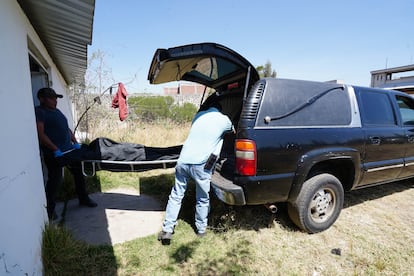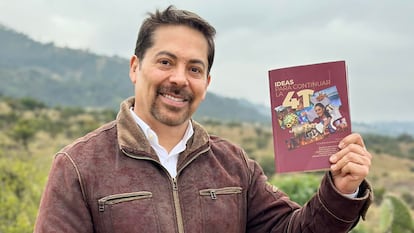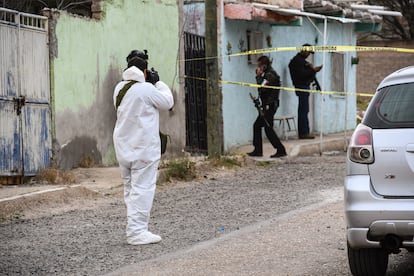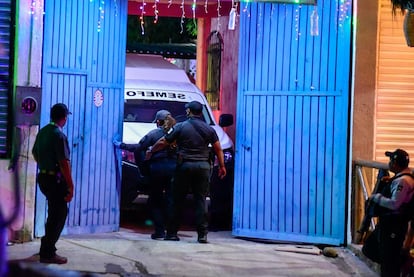Crime against politicians spikes ahead of campaign kick-off in Mexico
At least 33 people involved in politics, some of whom are aspiring to office, have been assassinated in the first two months of the year

The electoral process in Mexico has not yet officially kicked off and it is already stained with blood. At least 33 people involved in politics, many of them candidates for office in the June 2 elections, have been murdered in the first two months of 2024. Statistics have begun to trigger alarm bells, with fears that this year’s elections could turn out to be the most violent in the country’s history, as these figures are usually surpassed in each election. On Monday alone, two candidates for the municipal council of Maravatío, in Michoacán, were murdered. The campaign gets underway this Friday and the attacks have been relentless. Those keeping count of the violence report that in addition to homicides, there have been kidnappings, disappearances, shootings and death threats in at least 14 states.
One of President Andrés Manuel López Obrador’s ongoing challenges is the lack of security in Mexico, which is experiencing a spike and is gaining importance in the political arena. This year Mexico will elect 20,708 public positions, including for the presidency, governorships, local and federal congresses, municipal administrations and town councils. As the elections take place, violence statistics tend to escalate.

The first indicators of this year follow this line. In January alone, according to the organization Data Cívica, 35 attacks or threats against officials or former officials were registered. In 21 of these cases, the victims lost their lives. The data for February are still not definitive, but preliminary figures, which only cover the period up to February 10, indicate that the number of assassinations of political figures stands at 33, according to information provided by the organization to this newspaper. The count conducted by the consulting firm Etellekt in the 2021 elections showed that at least 35 candidates were murdered, while in the last presidential elections in 2018 the number of fatalities hit 48.
The role played by organized crime in this violence is a constant feature. Sometimes it pulls the trigger, sometimes it is simply embedded in the dispute for local power. It ensures its slice of power with all competing parties. A recent analysis carried out by the Colegio de México on 32 homicides committed around the 2021 elections found that candidates are assassinated to influence the outcome of an election. This is either to prevent a certain candidate from winning or to discourage citizens from voting.
The violence transcends all political stripes and affects all levels of government, but it is particularly concentrated at the local level. The last couple of attacks made an impact because they were attempts on the lives of two candidates for the same municipal presidency, in Maravatío. Miguel Ángel Zavala Reyes, of the Morena party, and Armando Pérez Luna, of the National Action Party (PAN), were shot in the streets of the municipality in the State of Michoacán, just five hours apart. Zavala Reyes was shot in his car as he was on his way out of the clinic where he worked, located one kilometer from the center of the city. Pérez Luna was gunned down by two men on a motorcycle in an Infonavit (Institute of the National Housing Fund for Workers) housing unit.

At the beginning of February, tragedy struck Ricardo Monreal’s family. First it was his brother-in-law, Juan Pérez Guardado, who worked as director of Social Development at the Fresnillo City Hall, in Zacatecas. He was gunned down while he was carrying out cleaning tasks on a sidewalk on the central avenue of the municipality. This was followed by the nephew of the Morena senator and state governor, David Monreal, barely four days after the first attack. On February 11, Jorge Antonio Monreal, also a municipal public official, was shot dead outside his home.
The list of political fatalities in February also includes the murder of Yair Romero, an aspiring federal deputy for Morena in the State of Mexico. Romero and his brother were fired upon on February 10, and their lifeless bodies were left strewn in the middle of the street in the municipality of Ecatepec, one of the most unsafe areas in the state. There was also Jaime Vera, pre-candidate for mayor of the municipality of Mascota, in Jalisco, who was shot dead on February 1 in the morning. The 62-year-old man belonged to the Ecological Green Party of Mexico.
The State of Morelos has also been hit hard. PAN councilor Alfredo Giovanni Lezama was attacked on January 5 at a gym in Cautla by a solitary gunman who entered the premises and shot him five times. That same day, in Chiapas, where organized crime has gained a stronger foothold in recent months, the death of David Rey González was also reported. The representative of the opposition Strength and Heart for Mexico party was vying for the mayor’s office in Suchiate. The armed gang fired four shots at him as he was traveling near the border with Guatemala. A third homicide was committed on the same fateful Friday. Sergio Hueso, a Citizens’ Movement mayoral candidate in Colima, was gunned down in the state capital.
In Guerrero, a married couple who were both politicians were also assassinated on January 24. Marcelino Ruiz Esteban, former mayor of Atlixtac, and his wife, Guadalupe Guzmán, a PRD councilor, were victims of an armed attack during the night. They were driving in their car on the highway when they were shot. In Michoacán, LGBT rights activist and advocate Miriam Ríos was fatally shot on January 6 while attending a commercial stand. She was the municipal commissioner of Citizens’ Movement in the city of Jacona.

Trans activist Samantha Gómez Fonseca was murdered on January 15 while returning from a visit to a prison in Mexico City. The former Morena senatorial candidate was fired at several times while traveling in a car in the Xochimilco borough of the capital. The list of fatalities also includes José Naredo García, leader of the PRD in Veracruz, who was gunned down in the municipality of Cuitláhuac on January 27. A commando member first tried to kidnap him, but when he was unable to do so, he shot him repeatedly. The death toll, which may seem high, does not even include those who were killed last year, because the electoral process began on an irregular basis many months ago.
The campaign officially kicks off on Friday and a highly intense three months lie ahead. The different opposition groups, at the federal and local levels, have called for security measures and a guarantee that the elections will be peaceful. The government, together with the National Electoral Institute, have endeavored to develop a plan to safeguard the candidates, but it has so far proved to be insufficient. The proposal, which included security detail of varying intensity depending on the risk to the candidates, has supposedly been in place for the last two weeks.
Sign up for our weekly newsletter to get more English-language news coverage from EL PAÍS USA Edition
Tu suscripción se está usando en otro dispositivo
¿Quieres añadir otro usuario a tu suscripción?
Si continúas leyendo en este dispositivo, no se podrá leer en el otro.
FlechaTu suscripción se está usando en otro dispositivo y solo puedes acceder a EL PAÍS desde un dispositivo a la vez.
Si quieres compartir tu cuenta, cambia tu suscripción a la modalidad Premium, así podrás añadir otro usuario. Cada uno accederá con su propia cuenta de email, lo que os permitirá personalizar vuestra experiencia en EL PAÍS.
¿Tienes una suscripción de empresa? Accede aquí para contratar más cuentas.
En el caso de no saber quién está usando tu cuenta, te recomendamos cambiar tu contraseña aquí.
Si decides continuar compartiendo tu cuenta, este mensaje se mostrará en tu dispositivo y en el de la otra persona que está usando tu cuenta de forma indefinida, afectando a tu experiencia de lectura. Puedes consultar aquí los términos y condiciones de la suscripción digital.









































